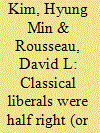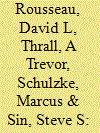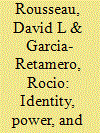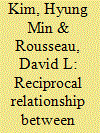| Srl | Item |
| 1 |
ID:
065948


|
|
|
| 2 |
ID:
114155


|
|
|
|
|
| Publication |
2012.
|
| Summary/Abstract |
Despite strong empirical evidence for democratic peace theory, the historical record indicates that democracies have been involved in many wars. This article conducts a critical examination of how democratic polities become entangled in international conflict. The examination focuses on how democratic leaders manage domestic politics and public opinion at each stage of the conflict (i.e. disputes, crises, wars and settlement). The study explores how democracies are drawn into conflict; when democracies provoke conflict; what claims democratic leaders make to justify conflict; when domestic audiences support or oppose conflict; and the implications for democratic leaders after conflicts. It argues that democratic leaders pursue various strategies that are shaped by the stage of the conflict, the domestic institutional structure and the level of mobilised domestic opposition.
|
|
|
|
|
|
|
|
|
|
|
|
|
|
|
|
| 3 |
ID:
079526


|
|
|
|
|
| Publication |
2007.
|
| Summary/Abstract |
Realists in international relations and realistic conflict theorists in social psychology argue that the perception of threat in intergroup conflict is a function of power asymmetries between groups. In contrast, social constructivists and social identity theorists argue that a shared sense of identity can reduce perceptions of intergroup threat. In this article, we test these competing arguments using three laboratory experiments conducted in two different countries (Spain and the United States). Four findings emerge from the experiments: (1) a weak position in terms of military power increases threat perception, as realists predict; (2) shared identity decreases threat perception, as constructivists predict; (3) an interactive relationship between power and identity appears in two of the three studies; and (4) shared identity increases cooperation in economic policy areas
|
|
|
|
|
|
|
|
|
|
|
|
|
|
|
|
| 4 |
ID:
117690


|
|
|
|
|
| Publication |
2013.
|
| Summary/Abstract |
Does democracy cause peace, or is democracy a consequence of peace? The burgeoning democratic peace literature has provided strong empirical evidence for the claim that democracies are a cause of peace. However, several skeptics of the democratic peace have suggested that the statistical findings are spurious. We test these competing claims using a simultaneous equation model. Using a unique data-set of all international disputes from 1960 to 1988, we find strong support for reciprocal causation. As the democratic peace theorists claim, democracy causes peace even after controlling for military conflict in the system and region. Conversely, peace in the region appears to encourage the development of democratic polities.
|
|
|
|
|
|
|
|
|
|
|
|
|
|
|
|